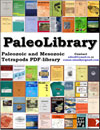
Complete Data Base of Paleozoic and Mesozoic Tetrapods.
Paleo-News and illustrations. Big electronic PDF-library.
| |
| PaleoNews |
| Classification |
| Books and Articles |
| Contact |
| Forum |
сайт о динозаврах
рейтинг сайтов
Free Counter
myspace hit counter
Dinosaur Metabolism and the Allometry of Maximum Growth Rate. |
|
The allometry of maximum somatic growth rate has been used in prior studies to classify the metabolic state of both extant vertebrates and dinosaurs. The most recent such studies are reviewed, and their data is reanalyzed. The results of allometric regressions on growth rate are shown to depend on the choice of independent variable; the typical choice used in prior studies introduces a geometric shear transformation that exaggerates the statistical power of the regressions. The maximum growth rates of extant groups are found to have a great deal of overlap, including between groups with endothermic and ectothermic metabolism. Dinosaur growth rates show similar overlap, matching the rates found for mammals, reptiles and fish. The allometric scaling of growth rate with mass is found to have curvature (on a log-log scale) for many groups, contradicting the prevailing view that growth rate allometry follows a simple power law. Reanalysis shows that no correlation between growth rate and basal metabolic rate (BMR) has been demonstrated. These findings drive a conclusion that growth rate allometry studies to date cannot be used to determine dinosaur metabolism as has been previously argued. Nathan P. Myhrvold (2016) |
